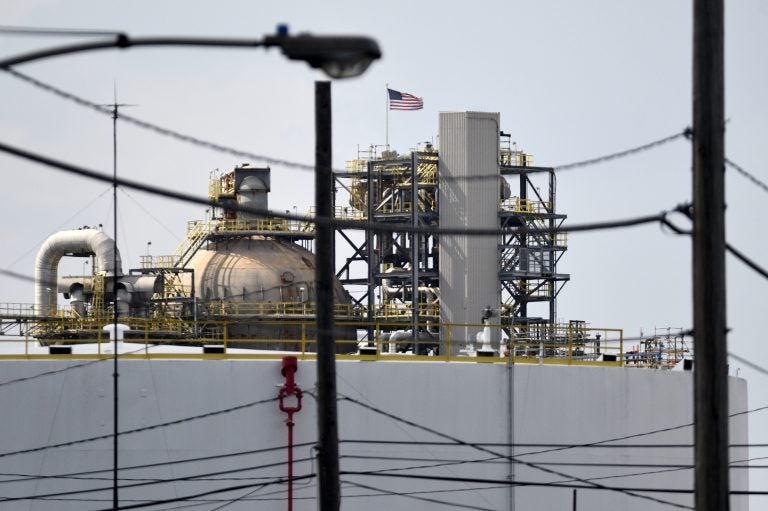Pro-refinery factions intensify pressure to negate PES sale agreement
Refinery supporters including union leaders have joined forces, with the backing of the White House, to question PES’ decision favoring the lower bidder.

Philadelphia Energy Solutions Refinery on August 8, 2019. (Bastiaan Slabbers for WHYY)
Factions that want to keep the Philadelphia Energy Solutions complex operating as a refinery are intensifying the pressure ahead of next week’s U.S. Bankruptcy Court confirmation hearing on the company’s Chapter 11 reorganization plan.
Refinery supporters including United Steelworkers union leaders have joined forces, with the backing of the White House, to question PES’ decision favoring the $240 million bid made for the South Philadelphia complex by Hilco Redevelopment Partners over a bid by Industrial Realty Group that was $25 million higher.
Industrial Realty Group’s $265 million bid at a closed-door Jan. 17 auction included a path to resuming refinery operations at the site, according to documents filed with the bankruptcy court in Wilmington.
“More than 600 hardworking USW members lost their jobs when PES shut its doors last year. Our members’ prospects for returning to good jobs will be dashed if the refinery site is sold to parties that would redevelop the property for other uses,” United Steelworkers International president Thomas M. Conway said in a statement issued Wednesday.
Hilco’s plans for the 1,300-acre site do not include refinery operations, according to city officials. The Chicago-based development company acquires obsolete industrial sites and remediates them to regulatory standards for further redevelopment. Shortly after the auction, Brian Abernathy, the city’s managing director and co-chair of its Refinery Advisory Group, said the majority of the site would likely be used as warehouse and logistics space for other development.
Hilco has not presented the details of its plan. Creditors of PES have until Feb. 3 to object to the proposed sale and vote on the company’s reorganization plan. The confirmation hearing before U.S. Bankruptcy Judge Kevin Gross is set for Feb. 6.
Former PES chief executive Phil Rinaldi, whose Philadelphia Energy Industries proposal didn’t make it to the final bidding process, teamed up with top-bidder Industrial Realty Group, a nationwide real estate developer based in California. Rinaldi’s plan is to resume the refinery operations and bring former union employees back to work. Last Thursday, he joined a group of union leaders led by John Dougherty, currently under indictment on federal corruption charges, on a visit to the White House looking for support on his bid.
Peter Navarro, one of President Donald Trump’s top trade advisers, told the Philadelphia Inquirer that the administration would “love to see” the site remain as a refinery.
A representative for Rinaldi said Wednesday that he was not able to comment because he was in New York City meeting with investors.
Ryan O’Callaghan, a spokesman for United Steelworkers Local 10-1, said Industrial Realty’s bid was better for the city and for former refinery employees. Most of them, he said, remain unemployed.
“It’s pretty obvious to me, if you owe a bunch of people money and you get a bid for more money, you would take the highest bidder instead of the lowest bidder. It’s almost like another slap on the face by PES to its former workers, for taking a lower bid,” O’Callaghan said.
His union did not take part in the trip to Washington, O’Callaghan said. He declined to clarify whether it was not invited or declined to go.
In an email, Mark Smith, the current PES chief executive officer, said he was unable to comment on the company’s decision concerning sale of the complex.
Last week, a committee representing unsecured creditors with no liens against the assets of the refinery recommended that its members reject the PES reorganization plan, arguing among other things that the winning auction bid was not the highest and that it did not include plans to reopen the refinery.
The committee has subpoenaed Hilco and issued a notice of deposition to PES to explore why the company chose the lower dollar-value bid.
A Hilco representative did not respond to a request for comment. Lauren Crumrine, director of marketing for Industrial Realty Group, declined to comment.
Mike Dunn, a spokesperson for the City of Philadelphia, said the city remains in contact with the court and all parties and will continue to weigh in when appropriate.
In an interview Wednesday, Jonathan Lipson, who teaches bankruptcy law at Temple University’s Beasley School of Law, said the unsecured creditors are trying to maximize what they can recover from PES, so they’re probably trying to make Hilco raise its bid or have Judge Gross reject the planned sale.
It’s not common to have the disappointed bidder, in this case Industrial Realty Group, surface after an auction has been decided, Lipson said. But usually, he noted, the winning bidder is the highest dollar-value bidder. When that’s not the case, he said, one of the things to explore is the ways in which the bidders are proposing to pay for the sale.
“What I think is really going on here, probably, is there’s just a lot of bargaining and haggling and negotiation all around trying to get the best deal for creditors,” Lipson said.
In theory, if everyone except the unsecured creditors supported the plan, the court could approve it anyway, he said.
“But that would involve a lot of litigation in the bankruptcy court, most likely, because it would be what is called a contested confirmation hearing, and it is just like a trial. And trials are expensive, and ugly. Nobody really wants that,” Lipson said.
Which is why he anticipates that if there’s no agreement before the confirmation hearing, things could get complicated. The whole process, he said, is designed to create negotiated outcomes.
“Unless [Philadelphia Energy Solutions] can make a really compelling case for why the Hilco bid is superior, they might have a difficult time in front of Judge Gross,” Lipson said.
He discarded the possibility that the White House might influence the sale.
“Judge Gross is a very thoughtful, even-handed person. He understands the economic pressures in these cases,” Lipson said. “I can’t imagine he would take a call from the White House. And I don’t know that any direct efforts by the White House to influence this are likely to be successful.”
Mark Alan Hughes, director of the University of Pennsylvania’s Kleinman Center for Energy Policy, called the combination of IRG’s bid and Rinaldi’s proposal a vampire bid “coming back from the dead.”
“I think that this vampire bid between IRG and the Rinaldi interests is not about getting more money for the unsecured creditors … It’s really about reopening the refinery,” Hughes said. “We have a combination of two losing bidders, one that lost spectacularly and one that came in second, combining forces to try to subvert the outcome of the initial auction and, frankly, are trying to pressure the judge in the media and through influence from the White House in advance of the judge’s ruling regarding the Hilco bid on February 6.”
Hughes said the market does not support reopening the refinery, which has been proved by the failure of PES to raise sufficient capital to do so. June’s explosion and fire in one of the refinery’s alkylation units spurred both the shutdown of the complex and the bankruptcy filing.
In addition, Hughes said, the report of the city’s Refinery Advisory Group — for which he led the environmental and academic committee — concluded there are “very well presented” public health and environmental concerns about continuing with refining operations at the site. Finally, he said, reopening the refinery wouldn’t mean stable jobs for former employees.
“Everything we’ve known about the practices of the recent owners of the refinery is that they cannot survive the market signals, the changes that are constraining refining on the East Coast of the United States. They weren’t able to do it last time, they weren’t able to do it the time before. We have no reason to believe that the same people will make it work this time,” Hughes said.
Harris Steinberg, director of Drexel University’s Lindy Institute for Urban Innovation, said both competing bids are short-sighted and not looking at the real potential of the site.
“Ultimately, I see this as a much more dynamic, integrated part of the city. … It’s larger than Center City, so it’s a vast amount of land that up until now has been predominated by an industry that seems to be obsolete,” he said.
Steinberg, who is leading an initiative to explore the long-term vision of the site with the Clean Air Council, believes it can be cleaned up so that it can accommodate economic development, houses, parks and even playgrounds.
“Absolutely. They’ve done it around the world, as well as in this country,” Steinberg said. “Look at the Navy Yard, look at the Pennovation Campus, that’s just two that are close by. Yes, we can do it, it might take time, but yes, it can be cleaned up.”
WHYY is your source for fact-based, in-depth journalism and information. As a nonprofit organization, we rely on financial support from readers like you. Please give today.






